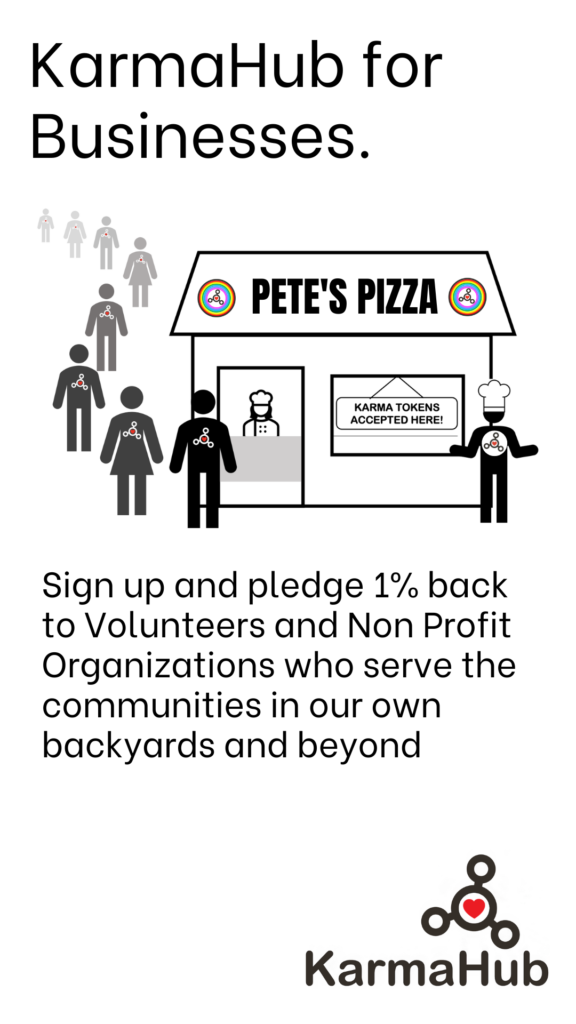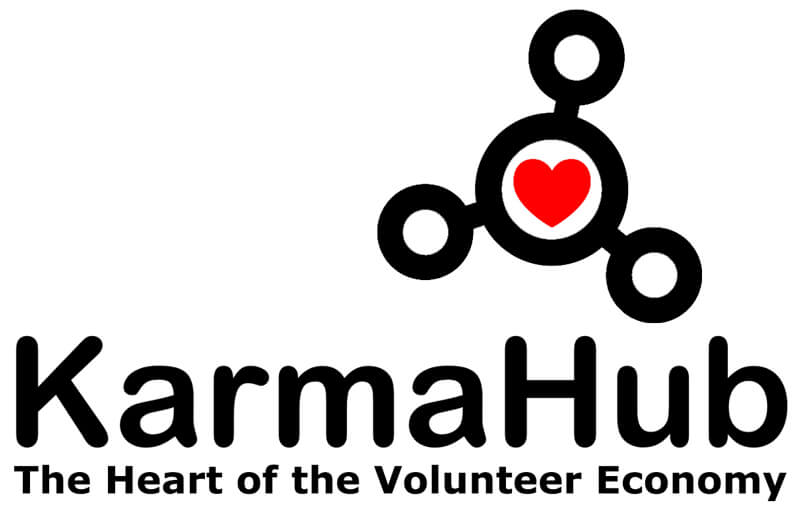Karma-Nomics 101 - "Pete's Pizza"
Here’s an example of how KarmaHub works for a business like yours.
Pete has owned a Pizza Shop for over a decade in Anytown, America. Not only does he make the best pizza in town, he’s also one of the biggest do-gooders in his area, regularly volunteering at his local dog shelter and soup kitchen.
When Pete heard about KarmaHub, he immediately thought it would be great if he could give pizza, soda and sandwiches to others in his area who also take pride in making their community a better place, but he wondered, how does it work? And will it cost him any money?

Let's take a look at how Pete calculates his 1% pledge, and gives back to Volunteers.
Pete signs up for KarmaHub and agrees to accept KarmaHub Tokens at his business, presented by Volunteers who volunteer in the KarmaHub Ecosystem.
Pete’s Pizza generated $100,000 in revenue last year
By joining the KarmaHub Ecosystem, Pete pledges to match up to 1% of his previous years sales into the KarmaHub Ecosystem (1% = $1,000).
Every time a customer presents a digital Karma Token (via QR code) at his point of sale, he extends a discount to the volunteer based on the value of the individual or combined tokens.
For every $1 in value of Karma Tokens redeemed at his pizzeria, Pete pays KarmaHub a $0.01 (1%) transaction fee.
If Pete manages to honor the entirety of his 1% Pledge over the course of the year, effectively giving back $1,000 worth pizza, sandwiches and Soda over the course of the year, Pete will pay $10 to participate in the KarmaHub Ecosystem.
Now let's met Susan, a KarmaHub Volunteer who happens to be walking down the street.
While Susan is out for a walk in her neighborhood she notices a sign “Karma Tokens Accepted Here!” in the window of a pizzeria she’d never been to before, but always wanted to try.
She remembers she participated in a KarmaHub Volunteering Event just a few weeks earlier at her local food pantry and generated 3 Karma Tokens.
Susan walks into Pete’s Pizza’s and orders a large pizza, an eggplant parmesan sandwich and a liter of soda. The total comes to $20 plus the state 7% sales tax, for a grand total of $21.40.
Susan takes out her phone, converts 2 of her Karma Tokens into a $20 KarmaHub QR Coupon Code. She keeps the remaining 2 Karma Tokens in her KarmaHub Account.
Pete scans the KarmaHub QR Coupon Code with his business version of the KarmaHub App, the code verifies, and the $20 discount is applied. Her new total is $1.40, which she pays for on her credit card as she normally would.
When the QR code is verified at the point of sale, the Karma Tokens and their respective coupons self destruct.
A transaction fee of 1% of the value redeemed coupon value is automatically deducted from Pete’s business account and transferred to KarmaHub. In this example, Pete paid KarmaHub a $0.20 fee ($20 x 1% = $0.20).
Susan is now a regular customer, and she comes back every week for pizza and other delicious food … sometimes she even brings a friend, who also becomes a new customer for Pete.
Since joining the KarmaHub Ecosystem, dozens of others in town have volunteered for their local non profits, and Pete has increased his sales by 10% all thanks to the good Karma generated by participating in the KarmaHub Ecosystem!
Volunteering is about to became a whole lot more rewarding.
karmahubvolunteers.org

